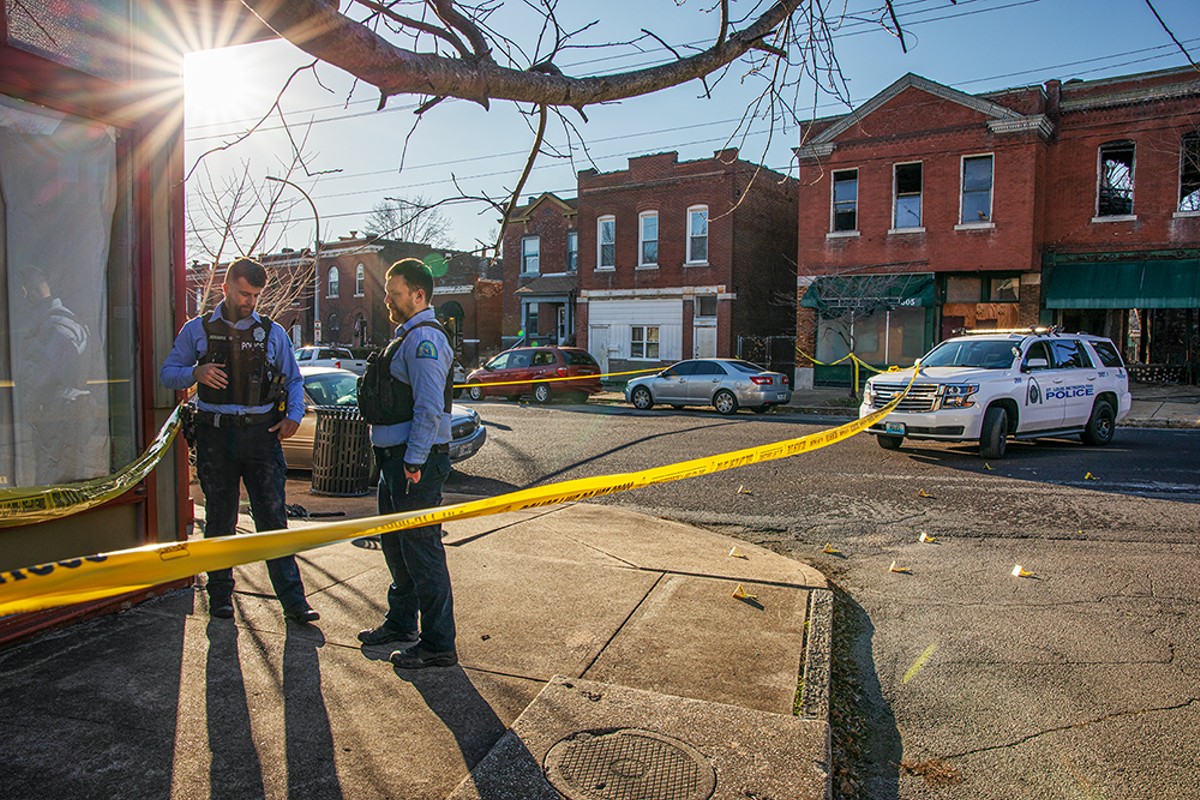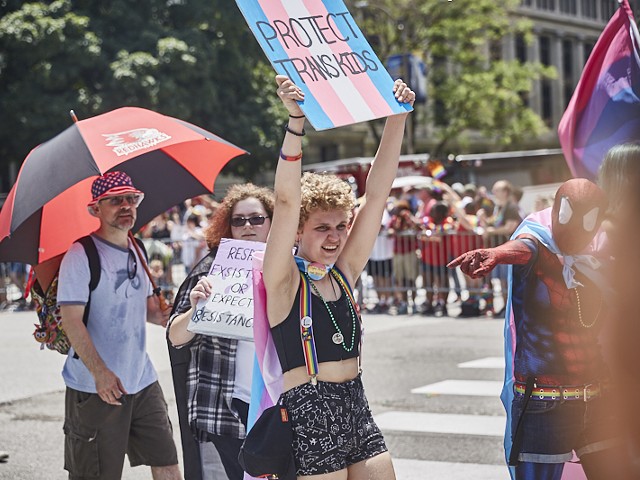Activists and community members packed the St. Louis Board of Aldermen’s Public Safety Committee meeting yesterday to call for stronger police surveillance transparency measures. They say the mayor’s executive order on the topic, which she announced last week, is flimsy and doesn’t offer true accountability.
The mayor hoped to use the existence of the executive order to force aldermen to act on red-light and speed cameras with urgency, but aldermen are resisting. Not only is the board deeply engrossed in discussing Board Bill 185, its surveillance transparency bill, but one alderman suggested the board refuses to consider passage of the automated traffic enforcement bill until it’s passed.
Ward 2 Alderman Tom Oldenburg said the board President’s Office is holding Board Bills 105 and 106 “hostage” until the police surveillance bill is passed. That’s even though the automated traffic enforcement bills were introduced five months ago, Oldenburg said.
“Political beefing between the president’s office and the mayor’s office is holding up cameras and their ability to save lives,” Oldenburg said.
The police surveillance bill, introduced by Ward 14 Alderman Rasheen Aldridge and co-sponsored by Ward 7 Alderwoman Alisha Sonnier, would put in place regulations governing the use of surveillance technology in the city and would require that these tools and their uses be approved by the board prior to implementation.
Aldermen are in a race with these technologies as they develop faster than they can be regulated, as the text of the bill points out.
“A number of studies have shown that surveillance technologies are developing faster than the laws to govern them, resulting in an imbalance between governance and the use of these technologies and causing numerous cities across the country to enact new and/or revised statutes to ensure the civil rights and liberties of their citizens where the lawful use of surveillance technology is approved by their local legislature,” the bill explains.
St. Louis Metropolitan Police Commissioner Robert Tracy also attended the meeting and opposed the bill saying it would hamper law enforcement’s ability to lower crime rates in the city.
“My primary duty is to protect the residents of St. Louis, and for that reason I cannot [support it] the way it’s written because we do have an executive order in place that I think is well written,” Tracy said.
Tracy said he hears community concerns that the city has no real oversight on the technology but says the surveillance tools are a necessary part of policing.
“First of all when you are down police officers, [like] every police department in the United States, you have to leverage technology,” Tracy said. “There are already guard rails and oversights through federal, state and local laws that are in place that we have to abide by.”
Board Bill 185 would simply create redundancies to oversight measures already in place and would make it more difficult for police to curb crime, Tracy said.
The bill has an emergency provision that allows police to use some new surveillance tools without approval if there is an emergency need to do so, so long as they obtain approval from the board in the 30 days after they implement it.
Tracy left the meeting before the community was allowed to speak.
Among the technologies St. Louis Police employ are controversial ShotSpotter detectors, license plate readers, and an extensive network of cameras throughout the city.
Chad Marlow, Senior Policy Counsel with the ACLU, spoke in favor of the bill at the committee hearing. Marlow and community members say the bill is part of “CCOPS” a project launched in 2016 by the ACLU to promote Community Control over Police Surveillance.
The goal of CCOPS is to move the secretive process, currently controlled by the police, of obtaining new surveillance tools to a transparent model that allows community input, Marlow explained.
“CCOPS is a racial justice effort,” Marlow said. “We [the ACLU] have found that surveillance technologies are disproportionately used against persons of color.”
Board Bill 185 would give a voice to the people most impacted by police surveillance technology, Marlow said.
The mayor’s executive order on “surveillance technology transparency and accountability” has different origins and different goals. It drew a sharp reaction last week from Aldermanic President Megan Green.
“An Executive Order is an insufficient tool to achieve accountability...The job of the legislative branch is to debate these issues in a public forum with the community,” Green said in a post to X (formerly known as Twitter). “The Board remains committed to that approach and expects the Administration’s cooperation in implementing Board Bills 105, 106, and 185 when they pass during this session.”
According to the mayor’s office, the executive order:
- Specifies how the SLMPD can and cannot use artificial intelligence and surveillance technologies;
- Requires the SLMPD to provide an annual report to the Board of Aldermen with extensive detail on use of surveillance technologies in use;
- Provides for increased transparency on how much money is being spent on these technologies;
- Prohibits vendors from providing access to or selling surveillance information or data to unauthorized individuals or selling it for anything of value;
- Specifies that SLMPD will only provide access to surveillance information or data to authorized individuals, and will create policies for the use and sharing of this information and data;
- Outlines requirements for the retention and storage of information and data collected through surveillance technology; and
- Requires that Missouri Sunshine laws be upheld when it comes to the disclosure or release of surveillance technology information and data.
Green points out that executive orders can be overturned by future mayors. And in a statement from Green’s office, Aldridge called the executive order a “half-baked effort” at accountability.
“It simply requests compliance from departments and reiterates pre existing regulations related to police conduct established by federal law,” Green said. “ Despite repeatedly engaging with the mayor’s office on this and many other issues important to the people of St. Louis, a pattern of evading responsibility is emerging.”
Community activists with Privacy Watch STL, are urging the Board of Aldermen to pass stronger reforms that would provide accountability and restrictions on surveillance.
“CCOPS is needed because police surveillance in St. Louis is unchecked and running rampant,” Inez Bordeaux, who works with ArchCity Defenders, said. “We know just from last week with the leaked ShotSpotter data that there are microphones all over this city.”
These microphones are predominantly in Black and Brown communities, Bordeaux said.
“We don’t know what’s happening with the Real Time Crime Center, we don’t know how much money they spend, how much data they collect, what they do with it, who they sell it to, who has access to it, we don’t know any of that,” Bordeaux said. “Because there is no legislation requiring that the police share that information.”
It is not too much to ask to know how this technology is being used in our communities, Bordeaux said.
“If SLMPD feels that transparency and accountability are simply too much to bear, that should be concerning not just to every person in the room, every person in this committee, it should be concerning to every person in the city,” Bordeaux said.
One person who spoke in opposition to the aldermanic bill was Joe Johnson, who represents SMS Novel. Johnson’s film production company has previously been in the news for its plan to fly spy drones over the city so paying subscribers can snoop on their neighbors in real time.
Recently Board Bill 199 passed out of this same committee and is headed to the full board. If it passes, it could end SMS Novel’s drone business endeavors in the city.
“Recognizing that our police are understaffed and under-resourced, I believe that any more form of bureaucracy that would prevent the high rates of homicide, crime and property theft in St. Louis would actually be detrimental to the health and safety of the most vulnerable citizens,” Johnson said.
After Johnson, who calls himself a “future resident of the 3rd ward” spoke, the crowd began yelling “you don’t even live here!” and were told to settle down by Chair Narayan.
The bill was not voted on at Thursday’s meeting and remains with the Public Safety Committee.
Subscribe to Riverfront Times newsletters.Follow us: Apple News | Google News | NewsBreak | Reddit | Instagram | Facebook | Twitter | Or sign up for our RSS Feed







